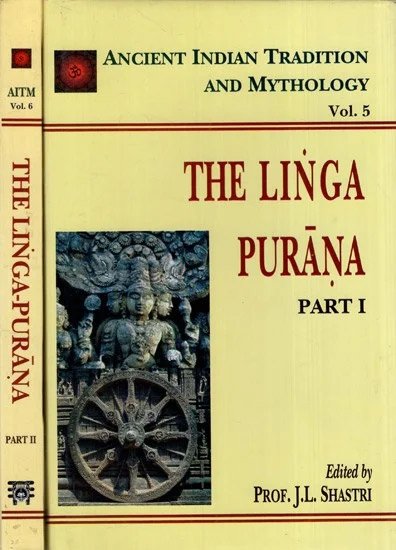The Linga Purana
by J. L. Shastri | 1951 | 265,005 words | ISBN-10: 812080340X | ISBN-13: 9788120803404
This page describes Coronation of the Sun and others (suryadi-abhisheka) which is chapter 58 of the English translation of the Linga Purana, traditionally authored by Vyasa in roughly 11,000 Sanskrit verses. It deals with Shaiva pilosophy, the Linga (symbol of Shiva), Cosmology, Yugas, Manvantaras, Creation theories, mythology, Astronomy, Yoga, Geography, Sacred pilgrimage guides (i.e., Tirthas) and Ethics. The Lingapurana is an important text in Shaivism but also contains stories on Vishnu and Brahma.
Chapter 58 - Coronation of the Sun and others (sūryādi-abhiṣeka)
The sages said:
1. Tell us now how Brahmā Prajāpati, who is the soul of all, crowned as overlords, Devas, Daityas and others.
Sūta said:
2. Lord Brahma crowned the Sun as the overlord of planets. Brahmā, Prajāpati, crowned Soma (Moon) as the lord of constellations and medicinal herbs.
3. (He crowned) Varuṇa as the lord of the Waters; the leading Yakṣa[1] (Kubera) as the lord of riches; Viṣṇu as the lord of Adityas; and Pāvaka (fire) as the lord of Vasus.
4. (He crowned) Dakṣa as the lord of Prajāpatis; Indra as the lord of Maruts; Prahlāda, the leading Daitya as the overlord of Daityas and Dānavas.
5. (He crowned) Dharma as the overlord of the Pitṛs; Nirṛti as the overlord of Rākṣasas; Rudra as the overlord of Paśus (Individual Souls) and Nandin, the leader of Gaṇas,[2] as the overlord of Bhūtas (goblins).
6. (He crowned) Vīrabhadra as the overlord of heroes; Bhayaṅkara (the terrible one) as the overlord of Piśācas (ghosts); Cāmuṇḍā who is bowed to by Devas as the sovereign of Mothers.
7. (He crowned) lord Nīlalohita, lord of the chiefs of Devas, as the overlord of Rudras; the elephant-faced lord Vināyaka, born of Vyoman[3] as the overlord of obstacles.
8. (He crowned) goddess Umā as the sovereign of women; goddess Sarasvatī as the sovereign of speech; Viṣṇu as the overlord of the wielders of Māyā and himself[4] as the overlord of the worlds.
9. (He crowned) Himavat as the overlord of the mountains; the Ganges (born of sage Jahnu) as the sovereign of the rivers; and ocean the storehouse of the waters as the lord of all seas.
10-12. Brahmā crowned the Plakṣa and Aśvattha as the lords of trees; he made Citraratha the lord of Gandharvas, Vidyādharas and Kinnaras; Vāsuki of terrible vigour as the lord of Serpents and Takṣaka of terrible vigour as the lord of Sarpas (Cobras). He made the leading elephant Airāvata of terrible valour the lord of elephants. He made Garuḍa the lord of birds. He made Uccaiśśravas (the horse of Indra) the king of horses.
13. He made the lion the lord of animals; the bull the lord of the kine and Śarabha (the fabulous eight-footed beast) the lord of lions; the incomprehensible Guha the lord of all commanders-in-chief and Lakulīśa the lord of Śrutis and Smṛtis.
14. He made Sudharman, Śaṅkhapāla, Ketumān and Hemaroman the overlords of all quarters in order.[5]
15. (He crowned) Pṛthu as the lord of the earth; Maheśvara as the lord of all; the bull-bannered omniscient lord Śaṅkara as the overlord among the four deities.[6]
16. By the grace of Śiva, the lord crowned these in due order. After crowning them at first the lord of the worlds felt fully satisfied.
17. O leading sages, this has been mentioned to you in detail: These persons of special characteristics were all crowned by Lord Brahmā the source of origin of the universe.
Footnotes and references:
[5]:
The four guardian deities, viz. Sudharṇian, Śañkhapāla, Ketumān, Hemaroman were consecrated in their respective quarters. Cf. Viṣṇu—[sudharmā śaṅkhapālaśca kardamasyātmajau dvija | hiraṇyaromā caivānyaścaturthaḥ kekumānapi | nirdhandvā nirabhīmānā nistandrā niṣparigrahāḥ | lokapālāḥ sthitā hyete lokāloke caturdiśam ||]—cited iṇ Śivatoṣiṇī.
